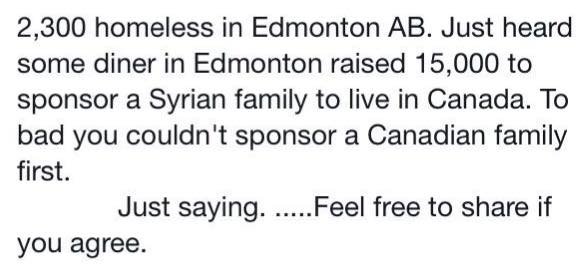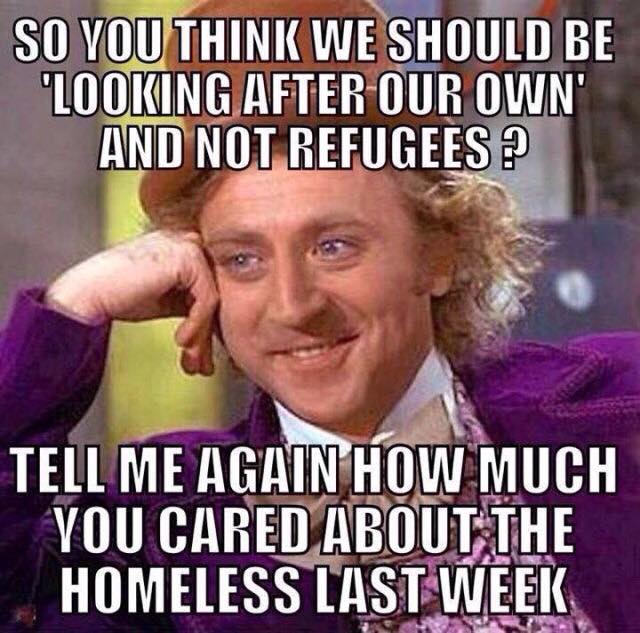The Paris attacks shook the world and dumbfounded many savvy social media users. Once details were released, the world mourned and paid support to France by donating money, blood and so forth to Red Cross and other honorable organizations.
The entire world commented on the tragic attacks, along with the torment that Syrian refugees face every day. But with care and consoling for these people, there always is a fallacious argument about why as human beings we shouldn’t help our own kind.
One of these main arguments is a very right-winged, close minded justification on how we should help the homeless and the veterans in our own countries like Canada before helping people in other parts of the world.
Here’s just a taste of this argument:

Then there’s this rebuttal meme.

Now, ISIS, the refugee crisis and homelessness are all very complex issues that many people don’t fully understand but it’s nice to see that people attempt to grasp the heart of these issues by taking to social media and expressing themselves.
But, as an advocate on helping the homeless, these kinds of memes, posts, and rants, drive me up the tree because like the ISIS and refugee crisis homelessness is not an easy fix.
Unlike ISIS, you can’t just say that the homeless are assholes. Unlike Syrian refugees, people who are homeless often go unnoticed. Unlike ISIS, governments around the world haven’t declared war and making it a top priority to resolve the issue. Unlike the refugees, many people aren’t welcoming to tolerate even the idea of donating a can of tuna to help. Unlike ISIS and the refugees, news outlets don’t provide for in-depth coverage to help their audiences understand the severity of homelessness.
So we get both sides of the coin when it comes to helping the homeless, especially now that it’s somehow has seeped into discussions about refugees and ISIS.
In short, Syrian refugees do need all the help and support they can get, and countries must be willing to help them as they continue to be displaced and suffer from a lack of support, resources, etc. on their journey’s to find solace.
As for ISIS, again the world must come together to help fight the never-ending war on terror but leave the religion biases out of it.
But for the homeless problem, you need to understand a few things like with the other issues before you impulsively post online that it’s an easy fix.
For the sake of argument, let me fill you in with how Canada has dealt with homelessness since the 1980s.
In the 1980s, Canada’s federal government decided to cut dramatically back social housing funds, which helps prevent homelessness. To get an idea of how severe these cutbacks are, you must realize that in 1982, 20,450 social housing units were built. But by 2006, only a mere 4,393 social housing units were made.
Another example of these cutbacks is Ontario’s track record of revenue. Between 1980 and 1986 an average of 17 percent of Ontario’s revenue came in the form of federal cash transfers. But between 1987 and 1995 it fell to 13 percent and by 2001, it fell to nine percent.
After 1993, when the federal government dismantled its role in building social housing units, it was left up to the provinces and municipalities to create ways of dealing with the costs of housing and homelessness. But of course, provinces and municipalities rely on federal funding for basic services like transit and infrastructure.
So, funding from lower tier governments was invested in maintaining these services rather than investing in social housing or addressing the issues that arise with homelessness.
By 2003, it was recorded that only one percent of total federal spending was for social housing.
Before the Harper government came to power, Canada had different organizations to make sure the government was doing their job, being open and transparent, and monitor the effectiveness of different initiatives.
Some of these organizations that kept the government in check consisted of law reform organizations that would assure that the government was creating laws that didn’t discriminate against different groups of people, including the homeless.
But they were stripped away by the Harper government because as we all know too well—the Harper government didn’t want anyone to know what they were doing.
In September 2006, the Harper government slashed $1 billion in spending, which eliminated the budget for even the Law Commission of Canada (LCC).
Darin Barney, Canada Research Chair in Technology & Citizenship at McGill University, wrote to the Justice Minister, Vic Toews:
“The social issues Canadians have in their communities are complex and dynamic. The Law Commission facilitates an approach to law reform that recognizes this complexity and is equal both to Canada’s diversity and to its common commitments to justice, equality, fairness, and accountability… it engages everyday Canadians directly in deliberating upon how law and the legal system can best serve their communities.”
It wasn’t the first time a law reform agency was shut down either by a conservative federal government. In the early 1990s, the Mulroney government abolished the Law Reform Commission of Canada.
So between funding and law commissions that would help people fight laws under The Canadian Charter of Rights and Freedoms, homelessness was even more marginalized because they were receiving little funding and then lost the ability to have even a chance to fight for their rights.
But even when homeless people or people waiting for social housing try to go to court to make a case about how the government has failed them over and over again—the Supreme Court of Canada(SCC) also fails them.
Last year, the SCC failed to appeal an Ontario Court of Appeal decision.
Tanudjaja v. Canada (Attorney General), 2014 ONCA 852 was a case from last year (2014) where several people, Jennifer Tanudjaja, Janice Arsenault, Ansar Mahmood, and Brian DuBourdieu went to fight for the right to adequate housing.
The group of people joined with Centre for Equality Rights in Accommodation, a non-profit organization that provides services to low-income people, families, and homeless people.
Who were these people? Were they addicts? Were they sick? Did they have families? What did they want?
Well, Brian DuBourdieu was diagnosed with cancer, which left him unable to work and that cost him his apartment. He lived on the streets and in shelters while being on the waiting list for subsidized housing for four years.
Jennifer Tanudjaja, is a young single mother of two receiving social assistance but lived in precarious housing. Even though Tanudjaja made extensive efforts, she was unable to secure housing within the social assistance shelter allowance. At the time of the case, she’d been on the waiting list for subsidized housing for over two years.
Ansar Mahmood, a father of two, was severely disabled in an industrial accident and even his one son uses a wheelchair. Mahmood lives with his wife and four children in a two-bedroom apartment that is neither accessible or safe for persons with disabilities. The family had been on the waiting list for subsidized accessible housing for four years.
Lastly, Janice Arsenault who has two young boys became homeless after her spouse died suddenly. For several years, she lived in shelters and on the streets. She was forced to place her children in her parents’ care. At the time of the trial, she was housed, but spent 64 percent of her small monthly income on rent, placing her in danger of becoming homeless again.
Sadly, when the appellants brought in a 16-volume record discussing all of the issues that the were facing the SCC upheld the lower courts design and denied the appeal.
The report was a whopping 10,000 pages long. It contained 19 affidavits—13 of which were from experts.
The appellants discussed how the federal government and the provincial government failed to provide adequate housing, along with cut backs on funding for shelters and housing. They also discussed the common marginalization they receive from society and how it makes them feel hopeless.
However, the SCC found that the claims for the government’s obligations under sections 7 and 15 of the Canadian Charter of Rights and Freedoms (the Charter) were not substantial.
If you don’t know what section 7 and 15 are:
7. Everyone has the right to life, liberty and security of the person and the right not to be deprived thereof except by the principles of fundamental justice.
15. (1) Every individual is equal before and under the law and has the right to the equal protection and equal benefit of the law without discrimination and, in particular, without discrimination based on race, national or ethnic origin, colour, religion, sex, age or mental or physical disability.
(2) Subsection (1) does not preclude any law, program or activity that has as its object the amelioration of conditions of disadvantaged individuals or groups including those that are disadvantaged because of race, national or ethnic origin, colour, religion, sex, age or mental or physical disability.
Now, the SCC stated during the case that the SCC shouldn’t rule on something that should be left for legislation and the government.
The SCC ruled that the Charter challenge holding governments responsible for the crisis in affordable housing and homelessness will never be heard in Canadian courts.
The SCC decision affirmed the Ontario Court of Appeal ruling and closed the five-year wait by homeless.
But, the housing crisis fuels the homelessness crisis in Canada still. As of last year, in five years Ontario’s affordable housing waiting list billowed at 168,711 households. And then the Harper government announced not to build 365,000 houses for low-income households across the country.
So the cost of keeping people homeless continues to skyrocket, last year is was estimated to cost about $7 billion annually.
But, as you can see an issue like homelessness is very complex because this is just talking about funding and the fact that even the SCC won’t help the homeless people.
So as a citizen of this country, or where you are reading from. Hep everyone, help the refugees, help fight ISIS, and help people at home. Posting on social media isn’t helping anything. Perhaps, if you learned anything from this post, you could read about these issues. Investigate them. Then you and your family or friends could help fight ISIS, help the refugees and the homeless by donating to pay for services and food and shelter.
If anyone of us has the least bit of a soul, you can realize that you can go outside the government conventions or the lazy ways of helping others by directly going to different organizations to help.
And don’t be a “not in my backyard” kind of person, cause even the acronym for it, NIMBY sounds silly like your belief in it.
United Way: http://unitedwaywinnipeg.ca/
Habitat for Humanity: http://www.habitat.ca/?gclid=CN7OpbXLoskCFQczaQodnoMCMA
World Vision: http://www.worldvision.ca/give-a-gift/Pages/bordercrossing.aspx
Red Cross: http://www.ifrc.org/en/what-we-do/where-we-work/europe/french-red-cross/
Very well said! You have raised a number of very important questions and issues on homelessness highlighting the complexity of what seems like one problem, but actually intersects with other important issues. You have an excellent grasp of systems involved in these issues!
LikeLike